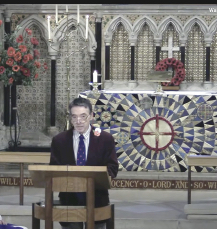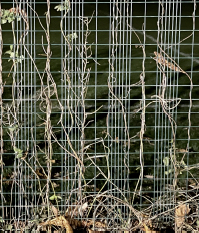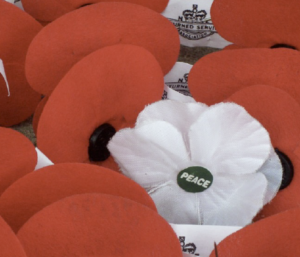11 November 2022
at St Mary’s Church, Iffley, Oxford
Simon Fisher

Friends, what a hugely solemn day this is. Many of us are remembering tenderly friends and family killed or wounded in war.
Like you, I remember. My grandfather was killed in the Somme in 1916, before my father was born. He fought and was wounded in the Second World War. My brother and brother-in-law both served in the armed forces. I grew up therefore in the military tradition. I even played the organ occasionally in Catterick garrison church. I have always respected military values.
But over the course of my life I have come to see things in a more complex light. When we prioritise peace with justice, the military side of things becomes one element in a much more complex mix of factors.
Family discussions for me at this time can therefore be challenging. But I think Remembrance Day poses challenges for all of us, especially at national level – if we will let it.
First, the meaning has perhaps become less clear as time passes and old soldiers die.
Secondly, and more important, Remembrance Day has lost its original sense of “this destruction is terrible – it must never happen again.” In living memory we have had WW2, Suez, the Falklands, Afghanistan, Iraq, Yemen (in which we are heavily engaged), Ukraine, and a good many other smaller wars below these headlines. What is coming next?

Could it be, I wonder, that the exclusive way we remember our own (as distinct from all) dead – at national level at least – is unknowingly cultivating the seeds of new wars?
Ezekiel put this exquisitely: “The parents ate sour grapes and the children’s teeth are set on edge.”
We could, of course, do Remembrance Day rather differently, and sometimes we can learn a lot from others. In Germany, for example, on 11 November, they remember all armed forces and civilians who have died, including victims of aggression. A central war memorial in Berlin depicts a mother cradling her dead child, with the inscription: “To victims of war and dictatorship.”
How one wonders does that reflect how they address conflicts now? How would we observe this day if we had lost WW2?
As I have wrestled with these issues, like many of you I imagine, I have come to see the red poppy as a still valid and important symbol, but it is insufficient if we want real peace. There are surely more wars ahead if we don’t start to include prevention as well.
I want to share with you briefly two possibilities of how we might do this.
One choice is to look outwards, as many of us here may already be doing, and see ourselves more as world citizens. What change might that make?
First, we might re-establish that excellent COVID-era principle: No-one is safe until we are all safe. A shift to human, or global security in fact, as distinct from national security alone.
Second, this would lead us towards acknowledging and trying to prevent everyone’s suffering, not exclusively our own.
Third, it would lead us to re-examine our national role in the world, including the huge arms trade we promote actively around the world, fuelling many conflicts in the name of jobs and profit.
This option is a tough call in today’s UK, though many would see it as simple common sense.

I visited Syria in 2016 during the brutal war, as part of a multi-faith, cross-party group, at the invitation of heads of faith communities there. We went to Aleppo and many other locations, and listened to people of all faiths and political persuasions. Below the top political level, everyone we met wanted peace and an end to the violence – at all costs. Winning and losing was far from their concerns. Everyone below the top was losing. They still are.
Ending everyone’s suffering and building everyone’s wellbeing – as well as that of the planet itself – is the core value of this global citizenship.
But today we are in church, not the town hall or at the cenotaph. We are trying to be citizens of God’s kingdom as well as subjects of Charles III. What is the Holy Spirit calling us to do?
Today’s readings give us a strong sense of direction. They speak of “beating swords into ploughshares”, and “turning spears into pruning hooks”. In the beatitudes we heard “how blessed are the peacemakers”, and “those who hunger and thirst for righteousness sake.”
Who are these people in our own day? They surely include those working to resolve wars and conflicts peacefully, and human rights defenders and those bravely resisting oppression non-violently in places such as Myanmar, Syria, Palestine, Iran, the Amazon. I have been fortunate to spend much of my working life with such people, providing training and other kinds of support – and learning so much from them. Perhaps we can include human rights defenders and those resisting dictatorship and oppression in our thoughts and prayers today.
If we accept, then, that the Holy Spirit is calling us in this direction, to embody Love in Action if you like, then we may feel compelled to ask: is it possible to be both citizens of the UK and of the Kingdom of God?
Well, we all seem to manage it, somehow.
If we look at the war in Ukraine, currently church and state are united in sending all the weapons we can and striving for a Ukraine victory. Justice seems to be the prime value. But who is weighing the price? The massive destruction and human loss down through the generations, the effects on the climate and on world poverty. What will victory really look like? The voice of power speaks. That of unconditional love seems lost. The Spirit offers no recipe, but it does ask us persistently, and often uncomfortably, to listen to the voice within.
Sometimes it breaks through. Many of us will have watched the late Queen’s funeral and lying in state. We will have noted the coffin, surrounded by royalty, the military, state, and church dignitaries. Medals being worn everywhere, even by the Dean of Westminster. And then something surprising. The commentator read out the inscription on the Westminster Cross, which was stationed right by the coffin.
“Nation shall not lift up their hand against nation, neither shall there be any more war.” (Isaiah 2:4). What a remarkable contrast with all that pomp and circumstance. And we might note that the previous verse to this reads, as we have heard today: “They shall beat their swords into ploughshares, and their spears into pruning hooks.”
The still small voice of unconditional love will not be silenced – on this day or any other. When we hear it we are irresistibly moved to face the uncomfortable paradox of joint citizenship, of having 2 passports if you like.
How do we resolve this? Each of us does, of course, in our own way.
Many of you may be ambivalent about the white poppy I am wearing alongside the red. You may even feel it represents cowardice, surrender. For me it symbolizes active peacebuilding, and complements the red.
Quakers have a core principle: “let us live in the spirit that takes away the occasion for all war.” Not easy to discern, or to do, but it can be a vibrant signpost for living.
Whatever your views on what I have said today, I hope we can all pause for a moment and ask ourselves: what exactly are we remembering? Why? And, so what?
I’ll end with the response of a well-known folk singer who lives nearby — Peggy Seeger. (Sung). (See You-tube for her singing this.)
There never can be peace, till men abandon fighting
As the way to deal with conflicts that prevent us from uniting.
Oh, how I long for peace, among the people and the nations.
How I Iong to halt the plunder of the wonders of creation,
How I long for Peace
Editor’s note:
Simon’s Remembrance Sunday sermon was video recorded and is available on the Iffley Church website a
https://iffleychurch.org.uk/sermons/sermon-on-remembrance-day/
– Click on blue “Available to watch live” button. The sermon starts at 21:49 minutes.
Peggy Seeger singing How I Long for Peace is on YouTube at
https://www.youtube.com/watch?v=onjWTza9QFE
| Next Article |
Back to December 2022 Newsletter Main Page
Forty-Three Newsletter • Number 524 • December 2022
Oxford Friends Meeting
43 St Giles, Oxford OX1 3LW
Copyright 2022, Oxford Quakers
